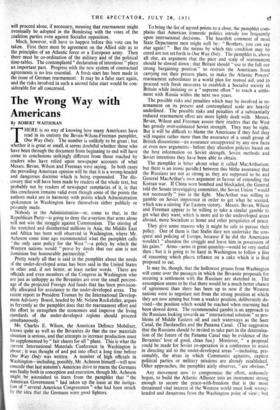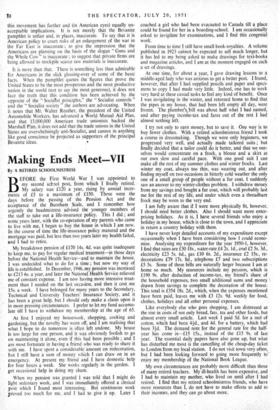The Wrong Way with
Americans
By ROBERT WAITHMAN
THERE is no way of knowing how many. Americans have read in its entirety the Bevan-Wilson-Freeman pamphlet, One Way Only. The number is unlikely to be great ; but whether it is great or small, it seems doubtful whether those who have been through the document from beginning to end will have come to conclusions strikingly different from those reached by readers who have relied upon newspaper accounts of what Messrs. Bevan, Wilson and Freeman were saying. In both cases the prevailing American opinion will be that it is a wrong-headed and dangerous doctrine which is being expounded. The dis- covery that will have been made by readers of the whole text, but probably not by readers of newspaper summaries of it, is that this conclusion remains valid even though some of the points the authors make are in harmony with points which Administration spokesmen in Washington have themselves either publicly or privately made. THERE is no way of knowing how many. Americans have read in its entirety the Bevan-Wilson-Freeman pamphlet, One Way Only. The number is unlikely to be great ; but whether it is great or small, it seems doubtful whether those who have been through the document from beginning to end will have come to conclusions strikingly different from those reached by readers who have relied upon newspaper accounts of what Messrs. Bevan, Wilson and Freeman were saying. In both cases the prevailing American opinion will be that it is a wrong-headed and dangerous doctrine which is being expounded. The dis- covery that will have been made by readers of the whole text, but probably not by readers of newspaper summaries of it, is that this conclusion remains valid even though some of the points the authors make are in harmony with points which Administration spokesmen in Washington have themselves either publicly or privately made. Nobody in the Administration--or, come to that, in the Republican Party—is going to deny the assertion that arms alone will not win the struggle against Communism. The stirring of the wretched and disinherited millions in Asia, the Middle East and Africa has been well observed in Washington, where Mr. Acheson some time ago recommended what the pamphlet calls " the only sane policy for the West "—a policy by which the Western nations would " prove by deeds that our aim is not dominion but honourable partnership." Pretty nearly all that is said in the pamphlet about the needs of the under-developed areas has been said in the United States in other and, if not better, at least earlier words. There are officials and even members of the Congress in Washington who are just as unhappy as the Bevanites are over the small percent- age of the projected Foreign Aid funds that has been 'provision- ally allocated for assistance to the under-developed areas. The recent report to President Truman by the International Develop- ment Advisory Board, headed by Mr. Nelson Rockefeller, argues as fervently as the pamphlet does that the rearmament effort and the effort to strengthen the economies and improve the living standards of the under-developed regions should proceed simultaneously. Mr. Charles E. Wilson, the American Defence Mobiliser, knows quite as well as the Bevanites do that the raw materials situation is serious, and that attempts to increase production must be supplemented by " fair shares for all " plans. This is what the current International Materials Conference in Washington is about ; it was thought of and put into effect a long time before One Way Only was written. A number of high officials in Washington—including, possibly, Mr. Acheson himself—will now concede that last autumn's American drive to rearm the Germans was faulty both in conception and execution, though Mr. Acheson might be astonished to learn from the pamphlet that " the American Government " had taken up the issue at the instiga- tion of " several American Congressmen " who had been struck by the idea that the Germans were good fighters. To bring the list of agreed points to a close, the pamphlet coole plains that American domestic politics intrude too frequently upon international decisions. The heartfelt comment of most State Department men might well be : " Brothers, you can say that again! " But the means by which this condition may be cured are not set forth in One Way Only. The pamphlet is, above all else, an argument that the pace and scale of rearmament should be slowed down ; that Britain should " use to the full our strong bargaining position " to restrain the Americans from carrying out their present plans, to make the Atlantic Powers' rearmament subordinate to a world plan for mutual aid, and to proceed with fresh measures to establish a Socialist society id Britain while insisting on a " supreme effort " to reach a settle- ment with Russia within the next two years.
The possible risks and penalties which may be involved in re- armament on its present and contemplated scale are heavily underlined. The possible risks and penalties of a substantially reduced rearmament effort are more lightly dealt with. Messrs. Bevan, Wilson and Freeman assure their readers that the West has grossly over-estimated Soviet strength. They may be right. But it will be difficult to blame the Americans if they feel they will require rather more than the assurance of a small group of British dissentients—an assurance unsupported by any new facts or even new arguments—before they abandon policies based on the best information on Soviet strength, Soviet methods and Soviet intentions they have been able to obtain.
The pamphlet is bitter about what it called MacArthurism, but there is an ironic parallel between this blithe assurance that the Russians are not as strong as they are supposed to be and General MacArthur's own argument in favour of extending the Korean war. If China were bombed and blockaded, the General told the Senate investig.ting committee, the Soviet Union " would not necessarily " join in the fight. MacArthur was willing to gamble on Soviet impotence in order to get what he wanted, which was a stirring Far Eastern victory. Messrs. Bevan, Wilson and Freeman appear to be willing to take a similar gamble to get what they want, which is more aid to the undeveloped areas abroad, more Socialism at home and other perquisites of peace.
They give some reasons why it might be safe to pursue their policy. One of them is that Stalin dare not undertake the con- quest and policing of Europe, because if he did the Americans -wouldn't " abandon the struggle and leave him in possession of his gains." Arms—arms in great quantity—would be very useful then ; but it is going to be hard in Washington to follow a line of reasoning which places reliance on a cake which it is first proposed to eat.
It may be. though, that the hollowest groans from Washington will come over the passages in which the Bevanite proposals for securing a settlement with the Russians are sketched in. -The assumption seems to be that there would be a much better chance of agreement than there has been up to now if the Western nations were to negotiate not from the strong position at which they are now aiming but from a weaker position, deliberately de- vised—the position which would be reached when rearming had been slowed down. The recommended gambit is an approach to the Russians looking towards an " international solution " to pro- blems of Middle Eastern oil and such waterways as the Suez Canal, the Dardanelles and the Panama Canal. (The suggestion that the Russians should be invited to take part in the determina- tion of the future of the Panama Canal may be evidence of the Bevanites' love of good, clean fun.) Moreover. " a proposal could be made for Soviet co-operation in a conference to assist in directing aid to the under-developed areas "—including, pre- sumably, the areas in which Communist agitators, captive political parties or military missions are already established. Other approaches, the pamphlet airily observes, " are obvious."
Any movement now to compromise the effort, arduously begun, to build the Atlantic Alliance into an instrument strong enough to secure the peace-with-freedom that is the most threatened vital interest of the Western world must look wrong- headed and dangerous from the Washington point of view ; but this movement has further and (in American eyes) equally un- acceptable implications. It is not merely that the Bevanite pamphlet is unfair and, in places, inaccurate. To say that it is American policy to court risks of an enlargement of the war in the Far East is inaccurate ; to give the impression that the Americans are planning on the basis of the slogan " Guns and the Whole Cow" is inaccurate ; to suggest that private firms are being allowed to stockpile scarce raw materials is inaccurate.
It is more than that. There is something less than admirable for Americans in the slick glossing-over of some of the basic facts. When the pamphlet quotes the'figures that prove the United States to be the most prosperous and the most productive nation in the world (not to say the most-generous), it does not face the truth that this condition has been achieved by the opposite of the " Socialist principles," the " Socialist controls " and the " Socialist society ' the authors are advocating. When it notes that Mr. Walter Reuther, the president of the United Automobile Workers, has advanced a World Mutual Aid Plan, and that 13,000,000 American trade unionists backed the Marshall Earl, it does not add that the trade unions in the United States are overwhelmingly anti-Socialist, and cannot in anything like good conscience be projected as supporters of the principal Bevanite ideas. •



































 Previous page
Previous page